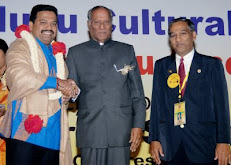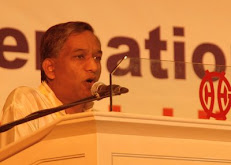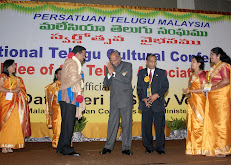
Was the 10th Prime Minister of India, serving from 1991 to 1996. First south Indian or Telugu from Andhra Pradesh who had served as Chief of Andhra
India was a poor country before PV NARASIMHA RAO Came to power ....he transformed the Indian economy and when he left office , India had foreign reserves worth 25 billion US DOLLARS .He enriched India Manmohan singh was the finance minister in PVNarasimha RAO cabinet . He led one of the most important administrations in India's modern history, overseeing a major economic transformation and several incidents affecting national security. Rao accelerated the dismantling of the Licence Raj. Rao, also called the "Father of Indian Economic Reforms," is best remembered for launching India's free market reforms that rescued the almost bankrupt nation from economic collapse. He was also commonly referred to as the Chanakya of modern India for his ability to steer tough economic and political legislation through the parliament at a time when he headed a minority government His mother tongue was Telugu. In addition to eight Indian languages, he spoke English, French, Arabic, Spanish, German, Greek, Latin and Persian.
P V Narasimha Rao served brief stints in the Andhra Pradesh cabinet (1962–1971) and as Chief Minister of the state of Andhra Pradesh (1971–1973). His tenure as Chief Minister of Andhra Pradesh
N.T.Rama Rao (then leader of the Chief Opposition party of Telugu Desam) did not want to put a contestant against Rao, because he was the First Prime Minister of India from Andhra Pradesh, and NTR did not want to create an obstacle on his path. By that, Rao won from Nandyal with a victory margin of a record 5 lakh (500,000) votes and his win was recorded in the Guinness Book Of World Records His cabinet included Sharad Pawar, himself a strong contender for the Prime Minister's post, as defence minister. He also broke convention by appointing a non-political economist and future prime minister, Manmohan Singh as his finance minister.
Major reforms in India's capital markets led to an influx of foreign portfolio investment. The major economic policies adopted by Rao include:Abolishing in 1992 the Controller of Capital Issues which decided the prices and number of shares that firms could issue. Introducing the SEBI Act of 1992 and the Security Laws (Amendment) which gave SEBI the legal authority to register and regulate all security market intermediaries
Encouraging foreign direct investment by increasing the maximum limit on share of foreign capital in joint ventures from 40 to 51 percent with 100 percent foreign equity permitted in priority sectors. Streamlining procedures for FDI approvals, and in at least 35 industries, automatically approving projects within the limits for foreign participation




.jpg)
.jpg)
.jpg)
.jpg)
.jpg)


No comments:
Post a Comment